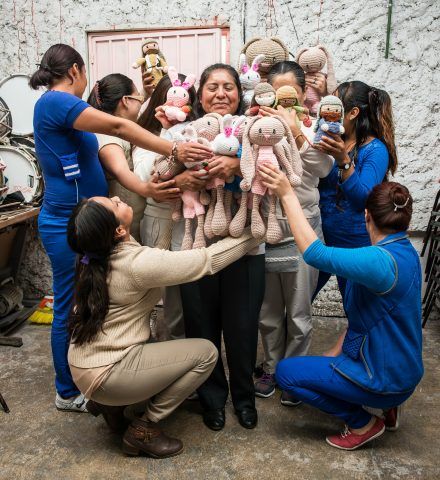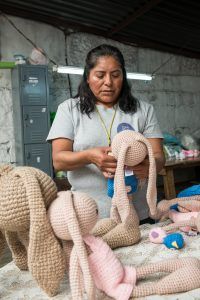La Cana, Mexico: providing female prisoners with employment and reintegration opportunities
4th October 2017

Lawyer Daniela Ancira explains why she founded La Cana, a social enterprise that is helping to improve the reintegration of female prisoners in the State of Mexico, by teaching skills that enable them to earn an income both in and after prison.
The State of Mexico is one of 32 states that make up the Mexican Republic. This entity is known for being the most populated in the country, and, over the last three years, has presented the highest rates of delinquency at the national level.
Along with fellow law students, I had the opportunity to visit a prison, known as Barrientos, within the state, where we saw the undignified conditions in which prisoners are kept, and listened to the life stories of the people who live there. This enabled us to understand that the problem of insecurity cannot be solved by isolating and separating; but by confronting and addressing the structural causes, motives and social, psychological and family reasons that led a person to act in a certain way. Mexican prisons have not been effective because they have failed to prevent people from continuing to commit crimes, by not offering inmates the opportunities and tools that would allow them to choose and create a life away from crime.
This was how La Cana emerged, as a project to provide prisoners with productive activities, training and skills that would help them earn an income to help their families, and, above all, prepare them to face the challenges of life on the outside. La Cana is a social enterprise that works with women in prison by facilitating various productive programmes and workshops, which are aimed at achieving the prisoners’ reintegration into society and thus contribute to reducing the rate of recidivism and crime in our country. What we do, primarily, is train inmates in various knitting and embroidery techniques, with workshops held weekly in each correctional facility. We are currently working with three penitentiaries in the State of Mexico: Nezahualcóyotl Sur, Juan Fernández Albarrán (Tlalnepantla de Baz), and Sergio García Ramírez (Ecatepec).
 We firmly believe that craftwork in prison – particularly knitting and embroidery – is not only an accessible workshop to implement, due to the fact that it doesn’t present major logistical problems and can adapt to the security protocols, but it is also a viable alternative to relieve stress for inmates: it is a calming, comforting and contemplative activity which can truly help them discover a more constructive and reflective side to themselves. Inmates can learn new skills and help support their families with the money they earn. They are well paid for their work, which is then sold around the country. Throughout the two years we have been operating, we have trained more than 200 women in needlework and knitting. 92 per cent of them say that they earn a bigger salary in prison than the one they earned before being imprisoned.
We firmly believe that craftwork in prison – particularly knitting and embroidery – is not only an accessible workshop to implement, due to the fact that it doesn’t present major logistical problems and can adapt to the security protocols, but it is also a viable alternative to relieve stress for inmates: it is a calming, comforting and contemplative activity which can truly help them discover a more constructive and reflective side to themselves. Inmates can learn new skills and help support their families with the money they earn. They are well paid for their work, which is then sold around the country. Throughout the two years we have been operating, we have trained more than 200 women in needlework and knitting. 92 per cent of them say that they earn a bigger salary in prison than the one they earned before being imprisoned.
92 per cent of the women say that they earn a bigger salary in prison than the one they earned before being imprisoned
It is important to remark that in Mexico’s penitentiary system, there are practically no job opportunities, and the majority of those that do exist are poorly paid and do not represent stable and formal jobs in the economy. Worse still, prison labour is not legally regulated at a local level, and the penitentiary public policies do not guarantee and respect the inmates’ labour rights.
In fact, in the State of Mexico – which is not an exception of what happens in the rest of the country – of the 25,946 men and women who are in prison, only 777 are incorporated into the penitentiary industry, which is the governmental department in charge of bringing employment into prison. This means that only 2.99 per cent of the prison population has a formal job in prison, while 65.23 per cent are part of the ‘informal economy’ and work by themselves, making crafts and other handmade goods with materials provided to them by their families or other visitors, which they then sell to whomever they can in order to earn an income while in prison. These activities, of course, are not supported by the authorities, so the inmates must find a way to obtain materials and sell their crafts. This includes, on many occasions, having to pay the prison guards a fee to let their families bring working materials to them, which causes terrible cases of corruption.
This great difference in the percentages of women and men formally working in prison has been made possible thanks to the efforts made by La Cana
These numbers, however, are most worrying with regards to the male population: though they represent 93.73 per cent of the prison population, only 1.2 per cent participate in the penitentiary industry, and 66.60 per cent work by their own means, or in the ‘informal’ economy.
Regarding women, who represent 6.27 per cent of the prison population in the State of Mexico, 44.86 per cent work in the informal economy or by themselves, while 21.63 per cent have a formal job in prison. This great difference in the percentages of women and men formally working in prison has been made possible thanks to the efforts made by La Cana and the support of the people who buy our products. We have been able to employ 23 per cent of the women in the penitentiary industry, which represents 5 per cent of the total female population in the State of Mexico.
Of the companies that are part of the penitentiary industry, La Cana provides the women with the highest income: an average of 42 per cent more than in other companies. Most importantly, the women feel productive, dignified, and no longer need to depend on their families for money to subsist in prison.
In Mexico, the prison conditions are infamous; far from achieving the social reinsertion of inmates, they are known as the ‘university of crime’. With the money the women earn, they are able to buy products for their personal hygiene (which in most cases are not provided by the correctional facilities), diapers for babies living in prison with their mothers, medicines, warm water, pillows, and other products to fulfil their basic needs. We also have a Collaboration Agreement with the State of Mexico’s government, in which, by law, they retain 10 per cent of the prisoners’ monthly income; this is held in a savings fund and then handed to them after they obtain their freedom, so that they are able to save money for a better future.
Most importantly, the women feel productive, dignified, and no longer need to depend on their families for money to subsist in prison.
In La Cana, we seek to empower women to create a better future for themselves and their families, and we do this not only by giving them the tools to grow in an economic sense but also on a personal level. We have learned that, to achieve a social rehabilitation process, it requires work in other areas – aside from economic tools – such as spiritual and personal growth, the family environment, psychological help, education, culture, and sports.
For this reason, we also carry out other productive tasks and workshops for the development and learning of skills and abilities, in which more than 250 women have participated. These have included workshops on artistic awareness, art psychotherapy, self-esteem, maternity in prison, addiction prevention, sexual education, yoga, meditation, art classes, dance lessons, individual psychological therapy and group therapy, among others. Throughout the implementation of our programmes, we have achieved gratifying results in the prison communities, such as:
- Improved mental health and social skills
- Promotion of a calm state of mind
- The passing of time productively
- A strong sense of achievement, pride, and self-confidence
- A more positive outlook on the future post-release
On the other side of the project, we seek to contribute to the development and implementation of regional and international norms and standards of criminal justice and human rights. We are actively working with the authorities to create a national protocol which can be used to regulate prison labour and prevent abuses. We participate in meetings and sessions with NGOs and governmental bodies, and cooperate with other civil society actors in networks and coalitions to focus on areas where, through our expertise, we believe we can engage.
We are also starting our Former Prisoners Programme, in which we continue to work with women who have obtained their freedom so they can keep dedicating their lives to productive and legal activities, away from violence and crime. Only a month after the inauguration of this programme, we are working with eight former inmates, who receive psychological attention in order for them to accomplish an effective and holistic rehabilitation process.
La Cana aims to broaden horizons beyond the prison walls, helping inmates to make a contribution by connecting them to a wider society and giving them a brighter outlook on their future. Our products are distributed throughout three main sources: (i) we have an online store where you can buy our products with shipping throughout the country (www.lacana.mx); (ii) we export and distribute them in the United States through another e-commerce platform (restructurestore.com); and (iii) we have partners in 11 states in Mexico, who sell our products in more than 19 stores around the country (lacana.mx/blogs/la-causa/puntos-de-venta).
We are proud of the results we have seen over the years, and we hope to replicate and expand our project to as many prisons as possible. We are witnesses of how buying a product that represents a cause means much more than only acquiring something new: it means changing the life behind the hands of the women who made it; it means bringing hope to a family; it means contributing to change around the world. If the reader ever buys one of our products, know that they are 100% artisanal, original, and unique. But most importantly, they are handmade with love.
Images: La Cana’s volunteer knitting teacher with prisoners (main image) and in the workshop (inset)